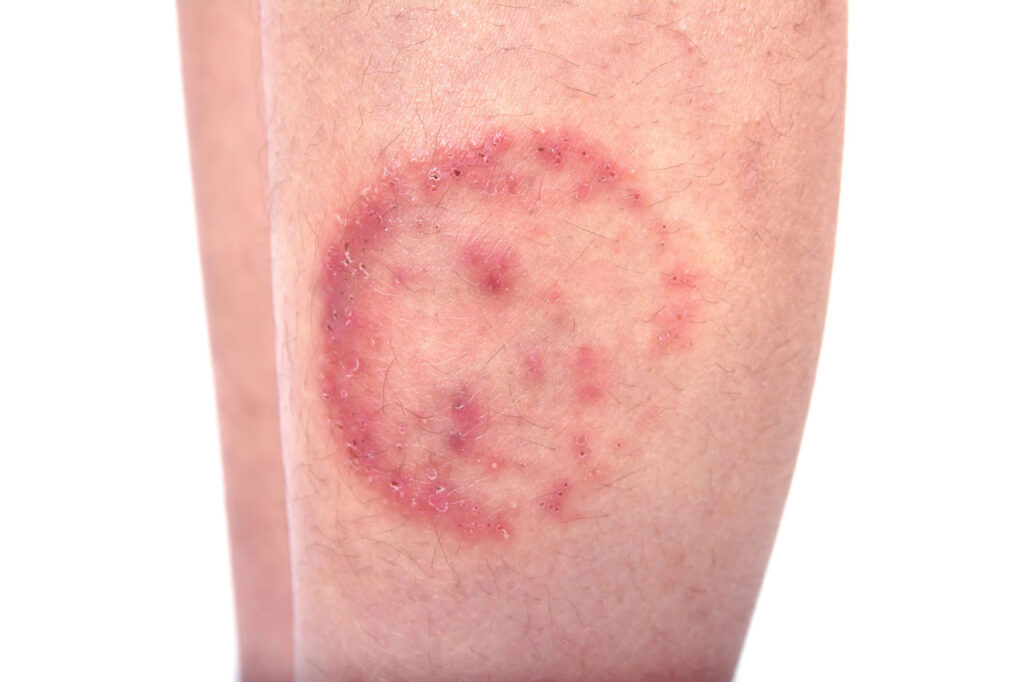
What is a fungal infection?
A fungal infection is caused by fungi that inhabit the dead tissue of your outer skin, nails, or hair. These infections occur when microscopic fungal spores from sources such as plants, trees, soil, yeast, or mold enter your body through direct contact or inhalation. Once inside, these spores multiply and cause infections.
Fungal infections, such as skin infections, can be localized and superficial or penetrate deeper into tissues, leading to more serious complications. The immune system responds to these infections with inflammation and potential allergic reactions.
At Houston Laser Skin Center, led by renowned dermatologist Dr. Solomon Brickman, we treat various fungal skin infections, including athlete’s foot, jock itch, ringworm, scalp infections, and yeast infections.
What are the risk factors for a fungal infection?
Fungal infections thrive in warm, moist environments. Risk factors include frequenting public pools, sharing personal items like clothes, engaging in outdoor activities such as gardening and trekking, and living in hot, humid regions. Additionally, taking antibiotics, corticosteroids, or contraceptives can increase susceptibility. Conditions and procedures that weaken the immune system, such as HIV/AIDS, chemotherapy, and organ transplantation, also heighten the risk.
What are the different types of infections fungal infections?
Various fungal infections can affect the skin:
- Athlete’s Foot
- Ringworm
- Scalp Infections
- Jock Itch
- Yeast Infections
These infections can cause redness, peeling, itching, and sores on the skin. Fungal infections can also affect nails and hair, leading to pain, nail discoloration, and hair loss. Additionally, fungi can infect internal organs, causing severe conditions such as lung infections, candidiasis (affecting the mouth, fingernails, or vagina), pneumocystis pneumonia, and potentially fatal meningitis.
How are fungal infections diagnosed?
Superficial fungal infections are often diagnosed by the visual appearance of the affected area. Dr. Brickman may conduct a skin scraping and examine it under a microscope to identify the specific fungus. A potassium hydroxide prep test can confirm the diagnosis and a special ultraviolet lamp may be used to examine infected skin.
Deeper infections require testing of blood, sputum, bone marrow, urine, or other infected tissues. Culturing these samples can detect and identify the specific fungus, and antibody levels in blood or other body fluids can aid in diagnosis.
What prevents fungal infections?
Maintaining good personal hygiene is crucial for preventing fungal infections. Specific preventive measures include:
- Athlete’s Foot: Use shower sandals in public pools, dry feet thoroughly after swimming or showering, allow sweaty shoes to dry before reuse, and avoid sharing socks.
- Ringworm: Keep pets clean, wear protective gloves and footwear while gardening, and avoid scratching infections.
- Scalp Infections: Don’t share hair brushes or accessories, keep hair clean and dandruff-free, and regularly wash bedspreads and pillowcases.
- Jock Itch: Change underwear daily, keep the groin area clean and dry, and avoid sharing clothing and bath towels.
What are my treatment options for fungal infections?
Treatment for skin and nail fungal infections typically involves topical antifungal medications applied directly to the affected areas. More severe infections may require oral or intravenous antifungal medications. The duration of treatment varies depending on the type and location of the infection and can range from a few days to ongoing therapy for years.
Dr. Brickman, with 50 years of dermatology experience, specializes in developing effective treatment regimens for various fungal infections. If over-the-counter medications have been ineffective, Dr. Brickman can help. Contact Houston Laser Skin Center today!
